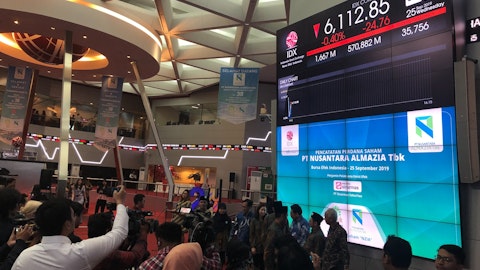Ashwin Shirvaikar: Got it. And then the other question was on LearnVantage and Udacity, I thought that was a particularly interesting deal. If you could walk us through maybe the mechanics of that deal? And every company is investing in talent care, there seems to be a bit different approach maybe. Can you just talk about the rationale, the downstream impact and so on?
Julie Sweet: Sure, thank you. Because it’s — I’m super passionate about what we’re doing with LearnVantage, because it is so critical for our clients. Talent is the number one agenda item for CEOs. The number one. And when you think about what reinvention means, the clients have to do and AI rotation and they have to do a talent rotation. And what LearnVantage does is, it first and foremost provides the ability for everything from the Board to the C-Suite to business users, to the technologists to get the technology training they need to make the right decisions on AI, for example. To be able to become deeper in the new technologies. And so it really goes from the Board to the technologist. And with Udacity what we’re able to provide is essentially the same approach Accenture uses, right?
So, we spent over $1 billion ourselves. You saw our latest average 14 hours per employee. And we have — we use learning science to learn and do. Most of our clients are unable to do that. The big differentiator for us in the market here is that, we Accenture know when you train someone we have to then put them on a job, and they have to get paid to do something, so they are work ready. So we’re bringing that expertise now at scale to our clients. And what Udacity does is the same thing, they use exports mentors, they have a real project work that they then coach people on. So it’s that same sort of approach of learn and do, but our companies — our clients don’t have all the work that we do, so Udacity has created this ability. And so — and it’s coupled then with Accenture’s deep understanding of what it takes to train and be work ready.
So we’re really excited about it. Our clients are excited about it, they’ve been coming to us. We’ve been doing this learning and this enables us now to do it at scale. And again, we want to be the reinvention partner. So the more that we can fill all of the needs of our clients around that, the better position that we will be. So we see LearnVantage is highly, highly strategic. And by the way, it also has, we have a managed service today to actually manage the learning services that companies are now doing internally, which we also expect to — we’re investing and expect to grow. So, very excited. And then finally, [indiscernible] responsibility is our — as corporates to bring our people along the journey. And so when people worry about things like AI in displacement, we feel that our ability to bring like who then upskilling expertise to help our clients be able to bring their people is really, really important.
It’s important for our communities. It’s important to their Board’s and we also consider it really important because it’s the right thing to do.
Ashwin Shirvaikar: Got it.
Julie Sweet: Great. So thanks, everyone. In closing. I want to thank all of our shareholders for your continued trust and support all of our people for what you do every day. To assure you that we are working every day to continue to earn that trust. Thank you.
Operator: That does conclude your conference for today. Thank you for your participation and for using AT&T Teleconference. You may now disconnect.
Follow Accenture Ltd (NYSE:ACN)
Follow Accenture Ltd (NYSE:ACN)
Receive real-time insider trading and news alerts





